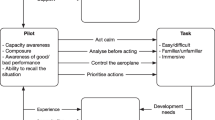Abstract
Ensuring safety and proficiency in aviation requires effective training and maintenance of pilot skills. Pilots must maintain currency, implying regular flight, though some critical elements (e.g. emergency procedures) are rarely practiced in-flight. Simulator sessions are employed for safe practice and training. Simulators provide more opportunities for pilots to experience sophisticated training without safety risks and dependencies on for example weather and logistics. While human assessors currently evaluate pilot performance, a simulator can provide rich data for assessments, utilizing learning analytics for individual insights. Simulator data (and potentially aircraft data) is not regularly used yet in training to gain insights in performance. Furthermore, current training planning lacks consideration for individual needs, relying on fixed intervals and syllabi. This study aims to investigate how simulator data can be used to assess performance and if it provides valid statements about pilot performance. Thereafter, the data is used to develop a skill retention model accommodating personal differences. The research involves Chinook helicopter pilots from the Royal Netherlands Air Force, using simulator data to create tailored performance metrics for maneuvers. The ongoing study investigates the integration of simulator data into training assessments and aims to contribute valuable insights into pilot performance and skill retention. This paper presents the preliminary findings in the development of learning analytics within this context.
Access this chapter
Tax calculation will be finalised at checkout
Purchases are for personal use only
Similar content being viewed by others
References
Wolting, J.: NAVO verandert huidige Force Model. Defensie Magazine - Landmacht 07 Artikel 8 (2022). https://magazines.defensie.nl/landmacht/2022/07/08_nieuwe-nato-force-model
Emmi, Y., et al.: How Training Infrastructure Can Improve Assessments of Air Force Readiness. RAND Corporation, Santa Monica (2023). https://www.rand.org/pubs/research_briefs/RBA992-1.html
Emmi, Y., et al.: Air Force Readiness Assessment: How Training Infrastructure Can Provide Better Information for Decisionmaking. RAND Corporation, Santa Monica (2023). https://www.rand.org/pubs/research_reports/RRA992-2.html
Society for Learning Analytics Research. https://www.solaresearch.org/about/what-is-learning-analytics/
Chittaro, L., Van der Pal, J., Oprins, E., Van Puyvelde, M., Taylor, H., Rankin, K.: Skill Fade and Competence Retention: A Contemporary Review. Brussels: North Atlantic Treaty Organization - Science and Technology Organization (2023)
Watz, E., Neubauer, P., Kegley, J., Bennet, W.: Managing learning and tracking performance across multiple mission sets. In: I/ITSEC (2018)
Vatral, C., Biswas, G., Naveeduddin, M., Goldberg, B.: Automated assessment of team performance using multimodal Bayesian learning analytics. In: I/ITSEC (2022)
Thijssen, D., Bosma, R.: Recommendation system in an integrated digital training environment for the 5th generation air force. In: I/ITSEC (2022)
Walsh, M.M., Gluck, K.A., Gunzelmann, G., Jastrzembski, T., Krusmark, M.: Evaluating the theoretic adequacy and applied potential of computational models of the spacing effect. Cogn. Sci. 42(S3), 644–691 (2018). https://doi.org/10.1111/cogs.12602
Sense, F., et al.: Combining cognitive and machine learning models to mine CPR training histories for personalized predictions. Int. Educ. Data Min. Soc. (2021)
Uddin, I., Imran, A., Muhammad, K., Fayyaz, N., Sajjad, M.: A systematic mapping review on MOOC. IEEE Access (2021)
Tillema, G., Roza, M.: Data-driven and personalized training as a service infrastructure & technologies. In: I/ITSEC 2023, Orlando (2023)
Forrest, N.: Conceptualization and Application of Deep Learning and Applied Statistics for Flight Plan Recommendation. Air Force Institute of Technology, Ohio (2020)
Civil-Military Cooperation Centre of Excellence. Measures of effectiveness (MoE) and measures of performance (MoP). CIMIC Handbook (2020). https://www.handbook.cimic-coe.org/
Royal Netherlands Aerospace Centre. Case: Multi-Ship Multi-Type Helicopter Simulation Training Capability (n.d.). https://www.nlr.org/case/case-multi-ship/
Berry, T.: Transportable Flight Proficiency Simulator [Photograph]. Vertical Magazine: Bron (2021). https://verticalmag.com/press-releases/u-s-and-international-crew-members-train-on-flight-simulators-in-germany/
Akerstedt, T., Gillberg, M.: Subjective and objective sleepiness in the active individual. Int. J. Neurosci. 52, 29–37 (1990)
Bessey, A., Waggenspack, L., Schreiber, B., Bennet, W., Jr.: Tackling the human performance data problem: a case for standardization. In: I/ITSEC (2022)
Goldberg, B., et al.: Forging competency and proficiency through the synthetic training environment with an experiential learning for readiness strategy. In: I/ITSEC (2021)
Vatral, C., Naveeduddin, M., Biswas, G., Goldberg, B.: GIFT external assessment engine for analyzing individual and team performance for dismounted battle drills. In: Ninth Annual GIFT Users Symposium (2021)
Twigt, A.: Task Force Defensienota 22 wil samen het verschil maken. De Vliegende Hollander (2023). https://magazines.defensie.nl/vliegendehollander/2023/09/06_successen-van-tf-22_slot
Monaghan, S., Wall, C., Morcos, P.: What Happened at NATO’s Madrid Summit? [Critical Questions] (2022). http://tinyurl.com/444wthkm
Walsh, M., Taylor, W.W., Ausink, J.A.: Independent Review and Assessment of the Air Force Ready Aircrew Program: A Description of the Model Used for Sensitivity Analysis. RAND Corporation, Santa Monica (2019)
Acknowledgments
This study is part of the Adaptive Learning Ecosystem program, funded by the Dutch Ministry of Defense (grant number L2201).
Author information
Authors and Affiliations
Corresponding author
Editor information
Editors and Affiliations
Ethics declarations
The authors have no competing interests to declare that are relevant to the content of this article.
Rights and permissions
Copyright information
© 2024 The Author(s), under exclusive license to Springer Nature Switzerland AG
About this paper
Cite this paper
Thijssen, D., de Marez Oyens, P., van der Pal, J. (2024). Navigating the Skies: Enhancing Military Helicopter Pilot Training Through Learning Analytics. In: Sottilare, R.A., Schwarz, J. (eds) Adaptive Instructional Systems. HCII 2024. Lecture Notes in Computer Science, vol 14727. Springer, Cham. https://doi.org/10.1007/978-3-031-60609-0_6
Download citation
DOI: https://doi.org/10.1007/978-3-031-60609-0_6
Published:
Publisher Name: Springer, Cham
Print ISBN: 978-3-031-60608-3
Online ISBN: 978-3-031-60609-0
eBook Packages: Computer ScienceComputer Science (R0)




